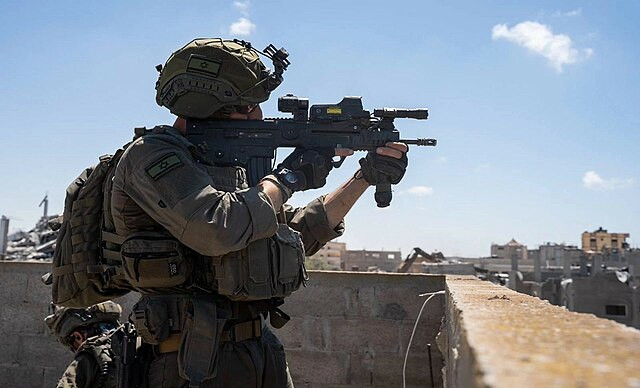Israel continued its military operations in Gaza on Monday, with a particular focus on the southern city of Khan Younis, as the international community increasingly pushes for a ceasefire to prevent the conflict from escalating into a broader regional war. The ongoing conflict, now in its 11th month, has already drawn in neighboring countries and heightened the risk of a wider confrontation involving Iran and its regional allies.
The Israeli military's strikes on Khan Younis resulted in the deaths of at least 18 people and injured several others, according to Palestinian medical sources. In addition to Khan Younis, Israeli airstrikes killed five people in Gaza City's Zeitoun suburb and two others in Rafah, near the Egyptian border. These strikes come amid renewed evacuation orders that have prompted thousands of residents to flee their homes in search of safety.
As Israel continues its offensive, Hamas has expressed skepticism about ongoing diplomatic efforts to secure a ceasefire. The group has voiced frustration with what it perceives as Israel's lack of commitment to any meaningful negotiations. "Mediators must force Israel to accept a ceasefire proposal based on ideas from U.S. President Joe Biden, which Hamas had accepted, instead of pursuing further rounds of negotiations or new proposals that would provide cover for the occupation's aggression," a Hamas representative stated.
Two sources close to Hamas told Reuters that the group believes the latest push for talks was pre-coordinated with Israel to dissuade Iran and Hezbollah from retaliating for the recent assassinations of key leaders. This comes after the killing of Hamas political leader Ismail Haniyeh in Tehran and a top Hezbollah commander in Lebanon, both of which have escalated tensions in the region.
Israeli Defense Minister Yoav Gallant, in a conversation with U.S. Defense Secretary Lloyd Austin, warned that Iran appears to be preparing for a large-scale military attack on Israel. This assessment follows recent attacks in the Golan Heights and the subsequent Israeli strike in Beirut that killed a senior Hezbollah commander. The assassination of Haniyeh the following day has only served to heighten fears of an impending regional conflict.
The situation in Gaza remains dire, with the Palestinian Health Ministry reporting that around 40,000 people have been killed since the conflict began, most of them civilians. Israel, however, maintains that a significant portion of those killed were fighters from Hamas and other militant groups. The ongoing violence has drawn widespread international condemnation, particularly following an Israeli airstrike on a school building in Gaza City over the weekend, which reportedly killed scores of people. The Israeli military claimed the strike targeted fighters from Hamas and Islamic Jihad, but both groups denied that any of their fighters were present at the time.
Amid the intensifying conflict, Israel has expanded its evacuation orders in southern Gaza. The Israeli military announced on Sunday that it would widen the humanitarian zone in response to what it described as Hamas's exploitation of the area for terrorist activities. Leaflets were distributed in Khan Younis, warning residents to evacuate immediately. "Remaining in this block has become dangerous," an Israeli Defense Forces (IDF) official stated, urging people to relocate to the newly established humanitarian zone.
The ongoing evacuations are among the largest since the conflict began, with the majority of Gaza's 2.3 million residents now displaced. The situation has led to a growing humanitarian crisis, with many civilians struggling to find safe refuge amid the relentless violence.
The conflict has also raised tensions between Israel and Iran, with both sides engaging in a series of retaliatory strikes. The United States has responded by bolstering its military presence in the region, sending a guided missile submarine and accelerating the deployment of the Abraham Lincoln strike group. U.S. Defense Secretary Lloyd Austin reaffirmed America's commitment to defending Israel in his recent conversation with Gallant, emphasizing the need to prevent the conflict from escalating further.




